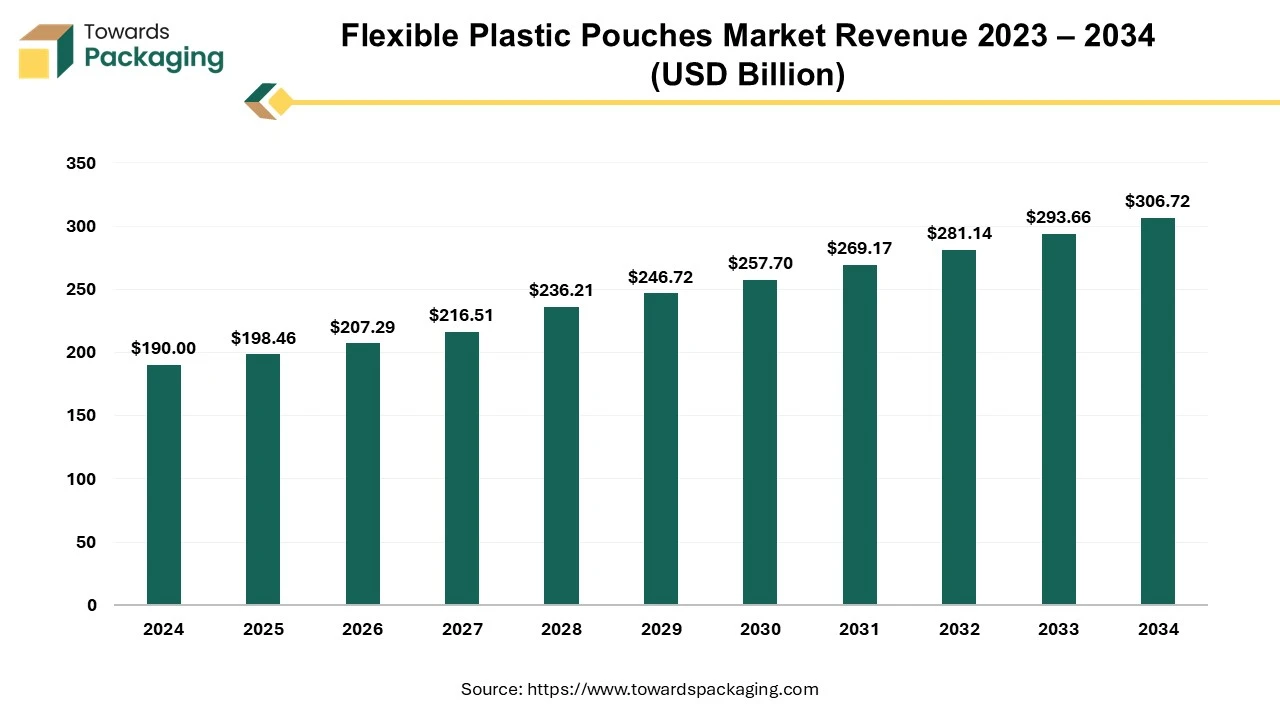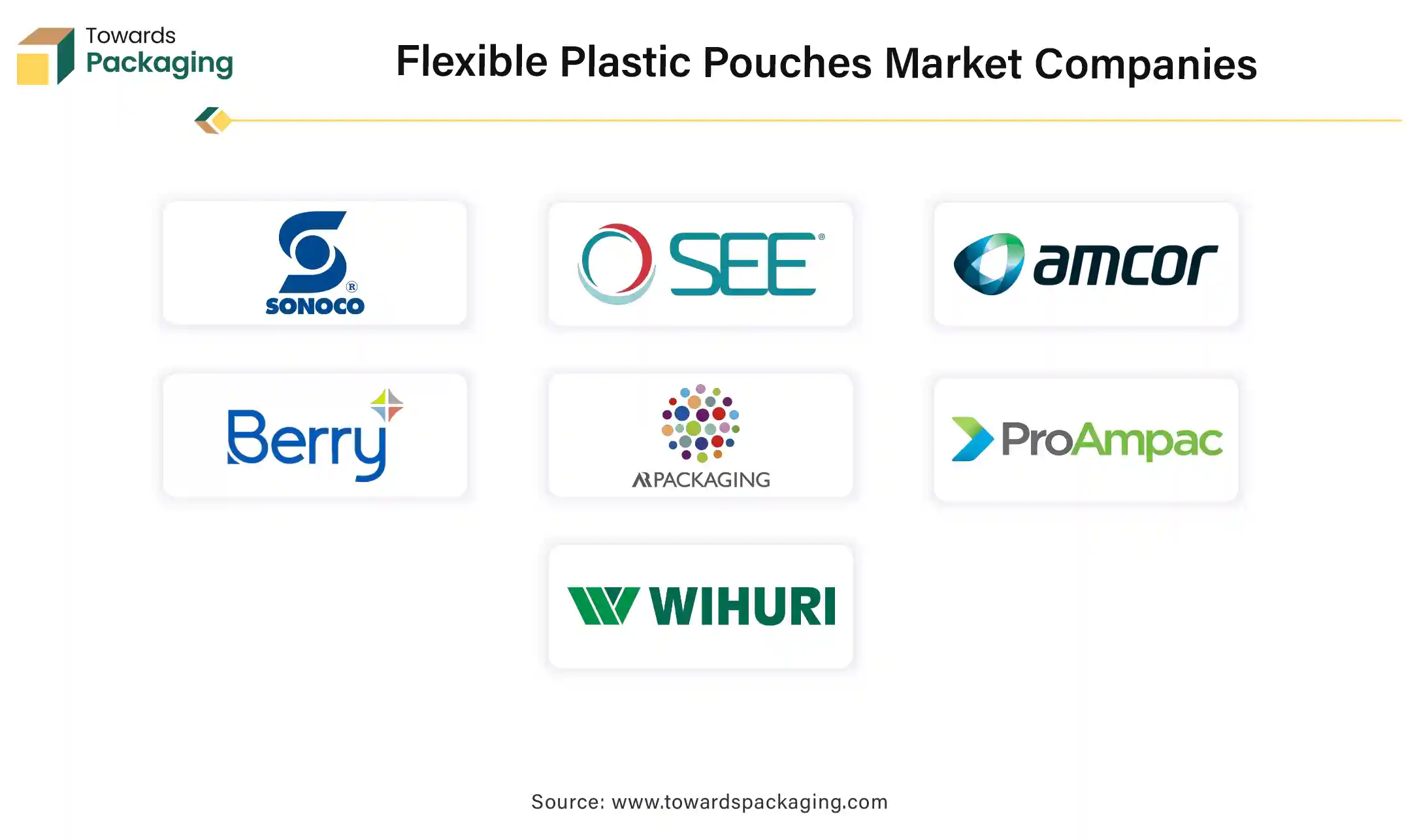March 2025
.webp)
Principal Consultant

Reviewed By
The flexible plastic pouches market is projected to reach USD 306.72 billion by 2034, growing from USD 198.46 billion in 2025, at a CAGR of 4.45% during the forecast period from 2025 to 2034.

The key players operating in the market are focused on adopting inorganic growth strategies like acquisition and merger to develop advance technology for manufacturing flexible plastic pouches which is estimated to drive the global flexible plastic pouches market over the forecast period.
Flexible plastic packaging is versatile packaging used for wide range of industries such as pharmaceuticals, cosmetics, food and beverages. These pouches are typically made from materials such as polypropylene, polyethylene, or multi-layer laminates, that offer strength, durability, and moisture resistance while remaining flexible. The flexible plastic pouches is manufactured in several styles, shapes, and sizes including stand-up pouches, flat pouches, and zipper pouches. They are also more space-efficient compared to rigid containers, reducing storage and transportation costs.
These pouches often feature resealable closures, such as zippers, spouts, or tear notches, which add convenience for consumers by allowing easy access and preservation of contents. Additionally, flexible plastic pouches can be transparent, providing excellent product visibility, or opaque for increased product security and branding. The flexible plastic pouches are made with recyclable materials or designed for lighter-weight packaging to minimize environmental impact. However, their recyclability depends on the material utilized and local recycling programs, which can sometimes limit their effectiveness.
Rise of online shopping, the demand for packaging that is light, compact, and protective has increased. Flexible plastic pouches meet these requirements by being durable and space-efficient, making them ideal for shipping products. As eCommerce platforms expands, the demand for packaging that is cost-effective, lightweight, and durable increases. Flexible plastic pouches provide the ideal solution for packaging groceries and medicines due to their ability to maintain product freshness, their flexibility, and their efficient use of space.
For medicines and groceries, maintaining product quality during transportation is critical. Flexible plastic pouches offer protective barriers against moisture, air, and contamination, which assists to preserve the quality of products. This is especially crucial for perishable items like food and sensitive goods like medications. Increase in online medicine and grocery shopping due to affordability, convenience, and accessibility fuels the demand for efficient and safe packaging solutions. As more consumers purchase these products online, the need for flexible plastic pouches as a packaging material increases proportionally.
The growth of eCommerce, particularly in groceries and medicines, directly drives the demand for flexible plastic pouches due to their convenience, cost-effectiveness, protective qualities, and potential for customization.
As sustainability becomes more important to both consumers and businesses, there is a growing demand for flexible pouches made from recyclable or biodegradable materials. Companies are increasingly adopting materials like biodegradable plastics, compostable films, and recyclable PET (polyethylene terephthalate) for packaging. Brands are also focused on reducing plastic waste through lightweight, minimalistic packaging designs that use less material while still providing product protection.
Stand-up pouches with resealable zippers are becoming more popular due to their convenience for consumers. They offer the ability to reseal packages for freshness, making them ideal for food products like snacks, coffee, and pet food. Stand-up pouches also offer superior shelf visibility and branding space, which makes them appealing for brands looking to differentiate their products on store shelves.
Flexible pouches are being produced in a wide range of shapes and sizes to cater to diverse product categories. Innovations include spouted pouches, shaped pouches (such as those for baby food or beverages), and pouches with convenient pouring or dispensing features. Brands are investing in innovative designs, such as pouches with easy-pour spouts or ergonomic shapes, to improve convenience and user experience.
Flexible pouches are expanding into industrial applications, including the packaging of adhesives, chemicals, and fertilizers. Their ability to contain hazardous materials safely, reduce transport costs, and provide customized sealing and dispensing solutions presents an opportunity in these sectors. Rising innovation and introduction of the flexible pouches for meeting consumer demand is estimated to create lucrative opportunity for the growth of the flexible plastic pouches market over the forecast period.
The key players operating in the flexible plastic pouches market are facing issue due to limitation announced by regulatory bodies as well as supply chain disruption, which is estimated to restrict the growth of the flexible plastic pouches market in the near future. Rising focus on sustainability and the environmental impact of plastic waste has led to increasing pressure on industries to minimize plastic usage. Flexible plastic pouches, often manufactured from non-biodegradable materials, contribute to plastic pollution, which is a key concern for consumers, regulators, and environmental organizations.
AI integration can significantly enhance the flexible plastic packaging industry across various aspects, including manufacturing efficiency, sustainability, quality control, and customer engagement. The AI integration can predict the maintenance and monitor the health of machines and equipment, predicting failures before they occur. This reduces downtime, minimizes maintenance costs, and ensures continuous production. AI can analyze production data in real-time to optimize variables such as temperature, pressure, and speed. This can lead to improved material yield, reduced waste, and lower energy consumption, enhancing overall efficiency. AI-powered automation and robots can streamline production lines, minimizing human labor, rising throughput, and reducing human error.
AI can assist in sourcing and designing more sustainable materials. By analyzing material properties and production data, AI can identify opportunities to minimize material usage or suggest alternative, more sustainable polymers. AI algorithms can analyze market trends, customer preferences, and historical sales data to offer accurate demand forecasting. This assists manufacturers plan production more effectively, minimizing overproduction or shortages.
Asia Pacific region dominated the global flexible plastic pouches market in 2024. The Asia Pacific region has well established pharma sector which continuously requires innovative packaging to represent in the market. APAC, particularly countries like China, India, and Vietnam, has a well-established, low-cost manufacturing infrastructure. The availability of cheap labor and cost-effective production processes makes it an attractive region for the production of flexible plastic pouches.
The rapid expansion of online shopping and e-commerce platforms in Asia Pacific, especially in countries like China, India, and Southeast Asian nations, has spurred demand for flexible packaging solutions. Flexible plastic pouches are ideal for e-commerce packaging due to their ability to reduce shipping costs and protect products.
With growing urbanization and a busy lifestyle in the Asia Pacific region, there is a rising demand for smaller, on-the-go pharmaceutical products such as single-dose sachets or small-volume liquid pouches. Flexible pouches are accurate choice for these types of products as they are compact, convenient, and can be designed for single or multi-dose use.
North America region is anticipated to grow at the fastest rate in the global flexible plastic pouches market during the forecast period. North American consumers are increasingly adopting fast-paced, on-the-go lifestyles, developing a growing demand for convenient, portable packaging. Flexible plastic pouches are easy to carry, lightweight, and often come with features like resealable closures, making them ideal for snacks, beverages, and ready-to-eat meals.
North America is home to many leading packaging companies that continuously innovate in flexible packaging materials. New advancements in barrier films, resealability, and consumer-friendly features (such as zip-locks, spouts, and easy-tear pouches) are driving the growth of flexible plastic pouches. North America region has convenience foods such as baby food, pre-packaged snacks, and ready-to-drink beverages has risen. Flexible pouches, which provides extended shelf life, ease of use, and minimal space requirements, are good choice for packaging these products.
The polyethylene (PE) segment held a dominant presence in the flexible plastic pouches market in 2024. Polyethylene is inherently flexible, making it ideal for producing pouches that need to bend or fold without breaking or losing shape. The polyethylene material is lightweight, durable, cost-effective, sealable, transparent and printability. Polyethylene is recyclable (especially low-density polyethylene, or LDPE), which makes it a more sustainable option compared to some other plastics. Increasing launch of the polyethylene (PE) flexible pouches has driven the growth of the segment over the forecast period.
The pouches segment accounted for a notable share of the flexible plastic pouches market in 2024. Pouches are lightweight, easy to handle, and portable. Their flexibility allows them to be easily squeezed or torn open, offering convenience for consumers, especially for single-serve or on-the-go products. Compared to rigid containers (like bottles or cans), pouches are cheaper to produce and require less material, reducing manufacturing costs and lowering the price of the final product. Flexible pouches take up less space in storage and transportation due to their ability to be compacted. This results in reduced shipping and storage costs, making them a more efficient packaging option.
The food & beverages segment registered its dominance over the global flexible plastic pouches market in 2024. Flexible plastic pouches offer lightweight, portable, and easy-to-store packaging options. As the food industry evolves to meet consumer demands for convenience, these pouches become an ideal solution for single-serve portions, ready-to-eat meals, snacks, and beverages. Flexible pouches are generally less expensive to produce compared to rigid containers.
Their lower material costs and ease of transport make them an attractive option for food manufacturers looking to reduce packaging costs while maintaining product quality. Flexible plastic pouches are often equipped with advanced barrier technologies (e.g., vacuum sealing, multi-layered structures) that help extend shelf life by protecting food from air, moisture, and light. This feature supports the food industry's growing demand for longer-lasting products with minimal preservatives.

By Material
By Product
By Application
By Region
March 2025
March 2025
March 2025
February 2025